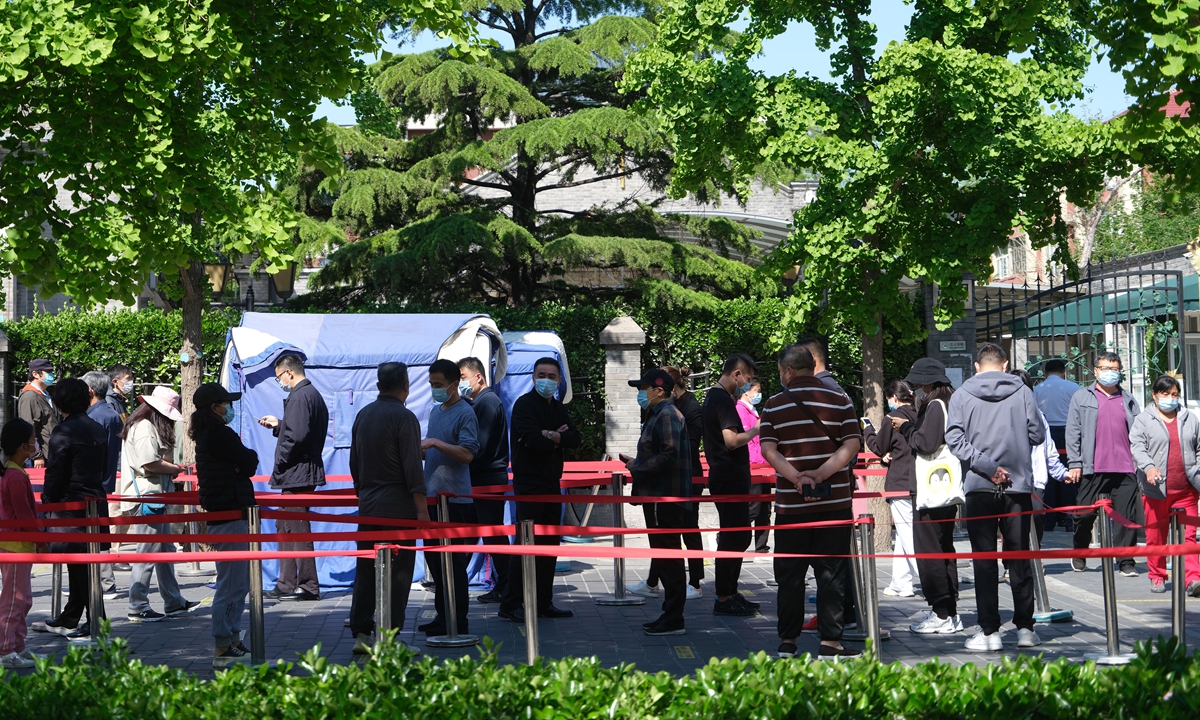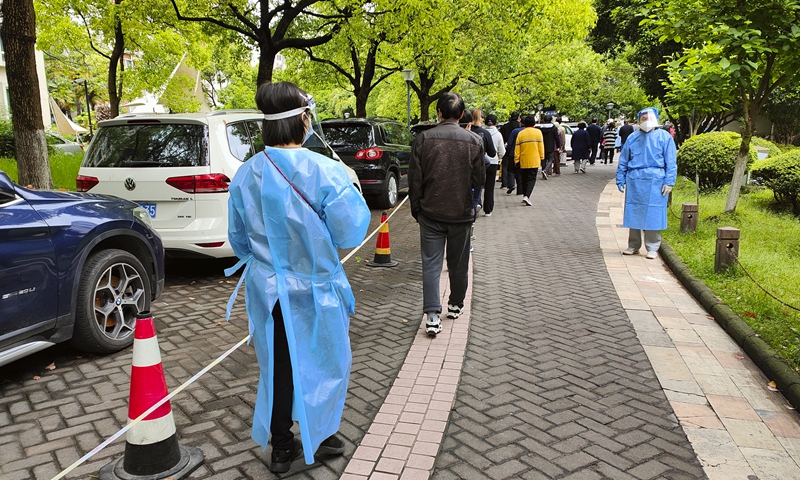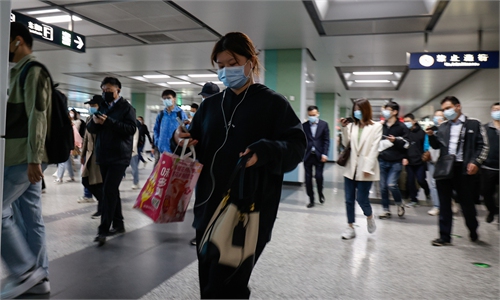Normalizing nucleic acid testing in Chinese metropolises 'transitional means' with minimum cost to fully social opening, resumption: expert

Beijing residents queue for a swab test for the Covid-19 coronavirus on May 1. Photo: IC
On the premise that the dynamic zero-COVID policy remains unchanged, large-scale lockdown can only be avoided through regular and normalized nucleic acid testing, meaning economic development and anti-epidemic work can be balanced; meanwhile, normalizing nucleic acid testing is a transitional means at minimum cost to the opening of the whole society and free movement of people in the future, Chinese experts said on Monday after several Chinese metropolises including Beijing issued new guidelines to normalize nucleic acid testing.The government of Beijing announced that starting from May 5, local residents must provide proof of a negative nucleic acid test result taken within seven days to enter public places and use public transportation systems, including the metro and buses.
For those who organize collective activities such as artistic performances or sports events, they will be required to be responsible for event safety, all participants need to test their temperatures and provide proof of a negative nucleic acid test result taken within 48 hours, as well as a proof of full vaccination.

People queue for a swab test for the Covid-19 coronavirus in Shanghai on April 29, 2022. Photo: CFP
Other Chinese metropolises including Shanghai, Guangzhou, Shenzhen and Hangzhou have announced similar guidelines to normalize nucleic acid testing, while require proof of a negative test result for tourists and local residents across public venues and transport systems.A senior expert close to the Chinese Center for Disease Control and Prevention (CDC) told the Global Times on Sunday on condition of anonymity that regular nucleic acid testing in big cities was to discover cases as early as possible and help government come up with more targeted epidemic prevention measures under China's current dynamic zero policy.
"We don't have other options except for nucleic acid testing to find early cases amid the stealthy spread of Omicron, and decision-makers can come up with more targeted and dynamic epidemic measures based on the analysis of the results of regular testing in order to prevent cities from resulting in large-scale lockdown like that in Shanghai," the expert said.
An immunology expert who also requested anonymity said that Beijing's move to normalize nucleic acid testing is a complementary measure to control the latest outbreak. "This is a local policy for Beijing. We have not seen the policy information that this approach will be promoted nationwide." The expert further pointed out that the current outbreak in Beijing is still in its early stage, so Beijing has strengthened control measures to detect infected cases as soon as possible, so as to effectively prevent the spread of the epidemic.
Regular nucleic acid testing being adopted in many cities was based on the experience of Shenzhen, which is among the first big cities to successfully control a local flare-up this year, according to a senior expert close to the Chinese CDC.
Shenzhen's regular testing, including requiring negative testing results within 48 or 72 hours while taking public transportation or entering into public places, since February has played positive role in its efforts to curb the virus spread and avoid long-term lockdown, according to the expert.
Cao Heping, an economist from Peking University, told the Global Times that the latest moves by Beijing and several other Chinese cities pointed to a trend in which the efforts to fight the epidemic and efforts to keep the economy going will go in parallel for some time in the future.
Having to show results for nucleic acid test to take a subway ride definitely is less convenient than before, but as a whole people who take the subway ride are safer, Cao said, noting that these efforts kept the economy functioning.
The fight against the epidemic has also helped to generate new growth mainly from the digital economy and the health care sector, these new growth areas could offset the negative impact on the economy by 0.2 to 0.3 percentage points a month.
Cao said in South China's Guangdong Province, health code, travel card and nucleic acid test results were already combined on one interface, helping the public save time. Innovations generated from fighting the epidemic will be a valuable asset for the Chinese economy when they are promoted across different sectors.
Regular nucleic acid testing has proven to be effective in preventing the worsening of the epidemic, said Zhuang Shilihe, a Guangzhou-based medical expert. Different from that at the early stage of the COVID-19 epidemic in 2020, currently one round of the testing can cover a large number of people at low cost. Therefore, now normalizing nucleic acid testing can achieve victory in the anti-epidemic battle at minimum cost.
"Normalizing nucleic acid testing is a transitional means with minimum cost to the opening and resumption of the whole society in the future," Zhuang said.
"It is impossible for the society to fully open at once from dynamic zero-COVID policy , and it must go through many different transitional stages, and regular nucleic acid tetsing is one of them," the medical expert noted.
He believes that a number of preconditions are needed to fully open up the society, including a sharp drop in cases at home and abroad, mass vaccination, especially among the elderly, and a large stockpile of effective drugs.
"None of the these conditions have been met," he said, noting that vaccination among senior citizens needs to be particularly strengthened.

